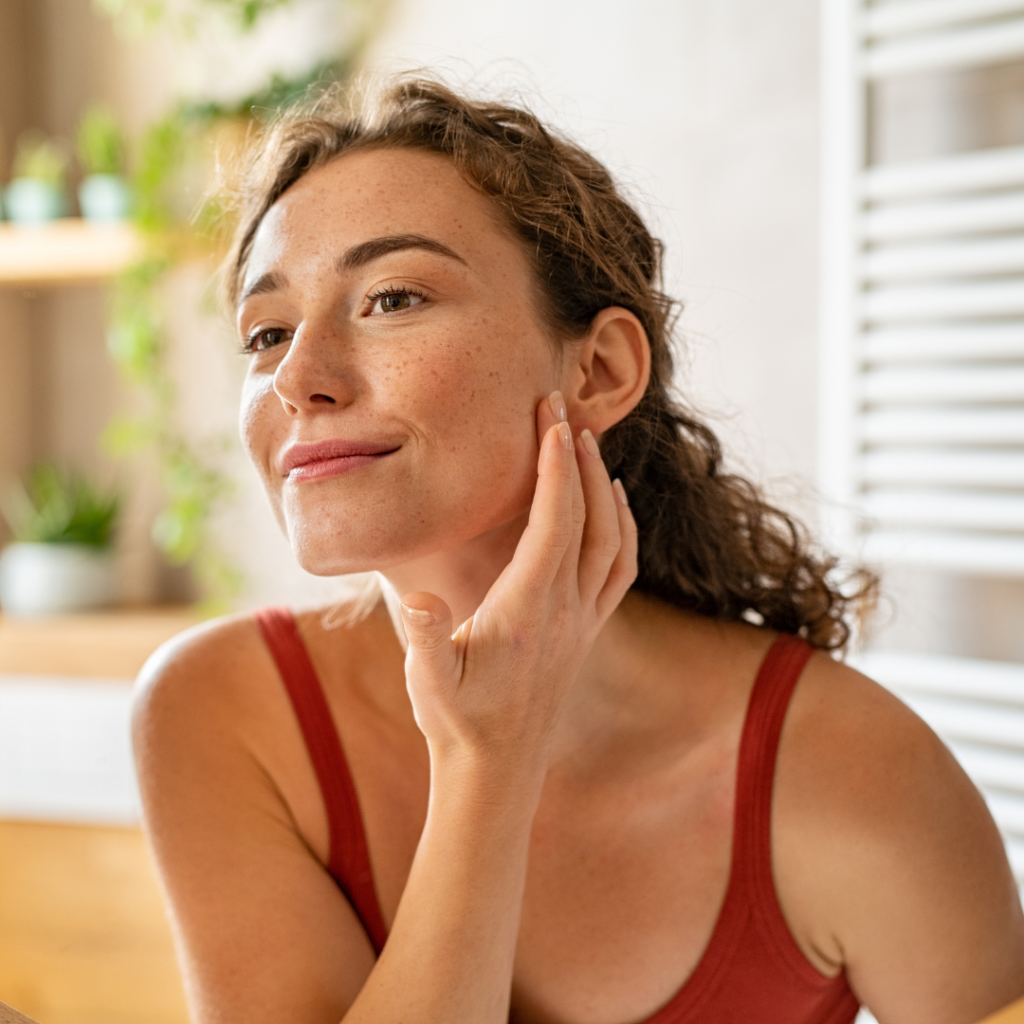
Do you know that most people believe in at least one skincare myth that could harm their skin? From the products we use to the frequency of our treatments, it can be hard to separate fact from fiction.
Debunking these natural skincare myths is essential for achieving and maintaining health and glowing skin. Clearing up misinformation prevents potential damage and empowers individuals to make informed choices about their skincare routines.
Let’s discover some skincare myths vs. common skincare facts and the truth behind 5 myths about skincare.
Myth#1: Oily Skin Doesn’t Need Moisturiser
This is one of the biggest skincare myths. Many believe applying moisturiser to oily skin will only make it greaser and lead to more breakouts. This misconception leads them to skip moisturiser altogether, thinking it’s the best way to control oiliness.
Debunking This Myth
Skipping moisturiser can trigger the skin to produce even more oil. When the skin is not properly hydrated, it can become dehydrated. The sebaceous gland goes into overdrive to compensate, making excess oil to maintain moisture levels. This can lead to a cycle of increased oiliness and potential breakouts.
Evidence
Dermatologists universally emphasise the importance of hydration for all skin types, including oily skin. Proper hydration helps maintain the skin’s barrier function and can reduce excessive oil production over time. According to the American Academy of Dermatology Association, “You must use moisturiser to keep your skin hydrated, even if you have oily skin.”
Practical Tips
Look for oil-free or gel-based formulas that provide hydration without clogging pores. Excellent ingredients include hyaluronic acid, glycerin, and lightweight, non-comedogenic oils. These products help balance the skin’s moisture levels without adding extra oil, keeping your skin healthy and less prone to overproducing sebum.
Myth#2: You Need To Wash Your Face Multiple Times A Day
Many people believe washing their faces multiple times daily is essential for maintaining clear skin. Frequent cleansing will remove all impurities and excess oil, preventing acne and other skin issues.
Debunking This Myth
Over-cleansing can strip the skin of its natural oils, leading to dryness, irritation, and even an overproduction of oil as the skin tries to compensate for the loss. This can result in a compromised skin barrier, making the skin more susceptible to environmental damage and breakouts.
Evidence
Dermatologists emphasise the importance of skincare facts to maintain the skin’s natural barrier and moisture levels. Dr Barbara Sturm says, “Too much washing removes lipids from the skin and damages the skin barrier, allowing bacteria to penetrate and causing breakouts, redness, irritation, neurodermatitis, and a reduction in the skin’s natural defence against UVA and UVB rays.”
Practical Tips
Face cleansing should be performed twice a day: in the morning and at night. This is usually sufficient to remove dirt, oil, and makeup without overstripping the skin. Choose a gentle, hydrating cleanser that fits your skin type. Always follow up with a suitable moisturiser to replenish hydration. If your skin feels tight or dry after washing, consider using a milder cleanser or washing less frequently.
Myth#3: Sunscreen is Only Necessary on Sunny Days
Sunscreen is often thought to only be necessary when the sun is shining brightly. They assume UV rays are less harmful on cloudy or overcast days and don’t require sun protection.
Debunking This Myth
Throughout the year, UV rays can penetrate clouds and damage the skin. Up to 80% of UV rays can pass through clouds, meaning your skin is still at risk even on overcast days. Daily use of sunscreen is essential to protect against these harmful rays, which can cause premature ageing sunspots and increase the risk of skin cancer.
Evidence
Dermatologists and skincare experts stress the importance of daily sunscreen use. According to the Skin Cancer Foundation, “sunscreens wash off eventually, none are waterproof.” It should be reapplied every two hours after a swim or excessive sweating.
Practical Tips
Make sunscreen application a part of your daily skincare routine, regardless of the weather. Use a broad-spectrum sunscreen that protects against both UVA and UVB rays. Opt for an SPF of at least 30 for adequate protection. To maintain effective protection, reapply sunscreen every two hours or more often if swimming or sweating.
Myth#4: Expensive Skincare Products Are Always Better
There is a common belief that higher-cost skincare products are always more effective and of better quality than their more affordable counterparts. Many consumers think that the price tag is a direct reflection of a product’s efficacy.
Debunking This Myth
The effectiveness of skincare products depends more on their ingredients and formulation than on their price. Expansive products often include luxury packaging and marketing costs, which do not contribute to the actual benefit of the product. Many affordable skincare products contain the same active ingredients and can be just as effective, if not more so, than high-end alternatives.
Evidence
Experts and dermatologists often highlight that price only sometimes correlates with quality. According to Dr. Charlotte Birnbaum of Spring Street Dermatology in New York City, “Even if they contain more rare ingredients, expensive products aren’t always the most effective.”
Practical Tips
Focus on the active ingredients in the product. Look for proven ingredients like retinoids, hyaluronic acid, vitamin C, niacinamide, and ceramides. Seek advice from dermatologists or skincare professionals who can recommend products based on your skin type and concerns. Always perform a patch test with new products to ensure they suit your skin and don’t cause adverse reactions.
Myth#5: Pores Can Be Shrunk Permanently
People mostly believe that pores can be opened with heat and closed with cold water, thinking this will make them smaller permanently. This misconception leads to practices like steaming the face to open pores and splashing cold water to close them.
Debunking This Myth
Pores do not have muscles to open or close, and they cannot be shrunk permanently. Heat can temporarily cause open pores to appear larger by softening the surrounding skin, while cold water can temporarily tighten the skin, making it appear smaller. However, these effects are not permanent.
Evidence
Dermatologists agree that the size of your pores is determined by genetics and cannot be permanently changed. Teen Vogue suggests that pore size is frequently genetic and cannot be eradicated. To reduce the size of your pores, pay special attention to products that increase collagen synthesis and protect the skin from the sun.
Practical Tips
Regularly cleanse your skin to remove oil, dirt, and dead skin cells that can clog pores and make them appear larger. Exfoliating helps remove dead skin cells and prevent clogged pores. Use a chemical exfoliant like salicylic acid or glycolic acid for effective results. Retinoids can help improve skin texture and reduce the appearance of pores by promoting clogging.
Is Skincare Actually Beneficial?
Martina Heffernan, owner of Skinsation Clinic, brings over 16 years of invaluable experience in skin clinics across Ireland and Australia. As a certified professional (CIBTAC & ITEC), Martina stays updated with the latest advances in skin care through continuous training. Martina has highlighted several myths about disorders of the skin and the truth about skincare products with different sources and discussions. Want more information or have other concerns? Book a free consultation now!
FAQs
1. Do I need to use an eye cream?
There is a thin and more delicate skin around the eyes than the rest of the face. An eye cream can provide extra hydration and address concerns like puffiness, dark circles, or fine lines.
2. Can you specify the steps on how I should apply my skincare products?
Generally, products should be applied in order from the thinnest consistency to the thickest. This allows lighter products to penetrate before heavier creams create a barrier. You should use a cleanser, toner or serum, moisturiser, and sunscreen during the day.
3. How can I tell if a product is suitable for my skin type?
Look for products labelled for your specific skin type (e.g., oily, dry, combination, sensitive). Patch testing new products is also crucial. You can test the product on your inner arm for 24 hours to see if it irritates. Consult a dermatologist for personalised recommendations for any underlying skin conditions or concerns.










